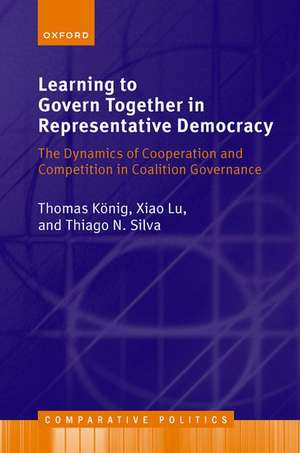Learning to Govern Together in Representative Democracy: The Dynamics of Cooperation and Competition in Coalition Governance: Comparative Politics
Autor Thomas König, Xiao Lu, Thiago N. Silvaen Limba Engleză Hardback – 29 mai 2025
Din seria Comparative Politics
- 30%
 Preț: 498.42 lei
Preț: 498.42 lei - 28%
 Preț: 436.87 lei
Preț: 436.87 lei - 30%
 Preț: 499.88 lei
Preț: 499.88 lei - 27%
 Preț: 439.61 lei
Preț: 439.61 lei - 17%
 Preț: 582.81 lei
Preț: 582.81 lei - 30%
 Preț: 724.31 lei
Preț: 724.31 lei - 24%
 Preț: 473.94 lei
Preț: 473.94 lei - 30%
 Preț: 593.78 lei
Preț: 593.78 lei - 30%
 Preț: 498.53 lei
Preț: 498.53 lei - 30%
 Preț: 860.24 lei
Preț: 860.24 lei - 30%
 Preț: 498.46 lei
Preț: 498.46 lei - 26%
 Preț: 545.40 lei
Preț: 545.40 lei - 13%
 Preț: 674.77 lei
Preț: 674.77 lei - 30%
 Preț: 556.87 lei
Preț: 556.87 lei - 30%
 Preț: 498.63 lei
Preț: 498.63 lei - 30%
 Preț: 498.20 lei
Preț: 498.20 lei - 30%
 Preț: 689.93 lei
Preț: 689.93 lei - 30%
 Preț: 603.00 lei
Preț: 603.00 lei - 30%
 Preț: 557.24 lei
Preț: 557.24 lei - 30%
 Preț: 533.72 lei
Preț: 533.72 lei - 30%
 Preț: 597.56 lei
Preț: 597.56 lei - 34%
 Preț: 1110.21 lei
Preț: 1110.21 lei - 28%
 Preț: 344.75 lei
Preț: 344.75 lei -
 Preț: 353.72 lei
Preț: 353.72 lei - 26%
 Preț: 773.47 lei
Preț: 773.47 lei - 18%
 Preț: 294.30 lei
Preț: 294.30 lei - 18%
 Preț: 294.64 lei
Preț: 294.64 lei - 24%
 Preț: 487.78 lei
Preț: 487.78 lei - 27%
 Preț: 504.48 lei
Preț: 504.48 lei - 8%
 Preț: 305.80 lei
Preț: 305.80 lei - 18%
 Preț: 295.11 lei
Preț: 295.11 lei - 31%
 Preț: 497.83 lei
Preț: 497.83 lei - 27%
 Preț: 330.46 lei
Preț: 330.46 lei - 34%
 Preț: 937.56 lei
Preț: 937.56 lei - 18%
 Preț: 357.58 lei
Preț: 357.58 lei - 19%
 Preț: 370.57 lei
Preț: 370.57 lei - 33%
 Preț: 606.32 lei
Preț: 606.32 lei - 20%
 Preț: 229.04 lei
Preț: 229.04 lei - 34%
 Preț: 1040.21 lei
Preț: 1040.21 lei - 30%
 Preț: 617.05 lei
Preț: 617.05 lei - 31%
 Preț: 467.50 lei
Preț: 467.50 lei - 22%
 Preț: 532.39 lei
Preț: 532.39 lei - 22%
 Preț: 730.85 lei
Preț: 730.85 lei - 19%
 Preț: 307.40 lei
Preț: 307.40 lei
Preț: 502.60 lei
Preț vechi: 721.57 lei
-30% Nou
Puncte Express: 754
Preț estimativ în valută:
96.18€ • 99.81$ • 80.39£
96.18€ • 99.81$ • 80.39£
Carte nepublicată încă
Doresc să fiu notificat când acest titlu va fi disponibil:
Se trimite...
Preluare comenzi: 021 569.72.76
Specificații
ISBN-13: 9780198959014
ISBN-10: 019895901X
Pagini: 176
Dimensiuni: 156 x 234 mm
Editura: OUP OXFORD
Colecția OUP Oxford
Seria Comparative Politics
Locul publicării:Oxford, United Kingdom
ISBN-10: 019895901X
Pagini: 176
Dimensiuni: 156 x 234 mm
Editura: OUP OXFORD
Colecția OUP Oxford
Seria Comparative Politics
Locul publicării:Oxford, United Kingdom
Notă biografică
Thomas König has been a Chairholder for European politics at the University Mannheim since 2007, after professorships at the German University, Washington University St. Louis, and the University of Konstanz. After studies at the universities of Heidelberg and Mannheim, he moved to the University of Kiel and started his international career with a Marie-Curie fellow as Assistant Professor at the University of Groningen, followed by a Heisenberg fellowship at Stanford University. In this period, he collaborated in several international projects, which were awarded by a nomination for the Descartes Prize and honoured by guest professorships.Xiao Lu is Assistant Professor at the School of International Studies at Peking University, and Director of Data and Methodology at Analytics Lab for Global Risk Politics, Peking University. He received his Ph.D. in Political Science from Mannheim University and his research focuses on developing both theoretical and statistical models for analyzing heterogeneous and dynamic political process, with a special focus on party competition, legislative decision making, and political representation and accountability of coalition governance in European countries. His work has been published in American Political Science Review, Political Analysis, European Journal of Political Research, Journal of Theoretical Politics, among others.Thiago N. Silva is a Lecturer at the School of Politics & International Relations and Deputy Director of the Australian Centre for Federalism at the Australian National University. Silva received his Ph.D. in Political Science from Texas A&M University, USA, and, from 2019-2022, was a Postdoctoral Researcher in Political Economy at the University of Mannheim, Germany. His research agenda focuses on comparative politics, with an emphasis on political institutions and political economy. In his recent projects, he examines the dynamics of coalition governance in both presidential and parliamentary democracies and their impact on party competition, voter behaviour, and opposition behaviour.
